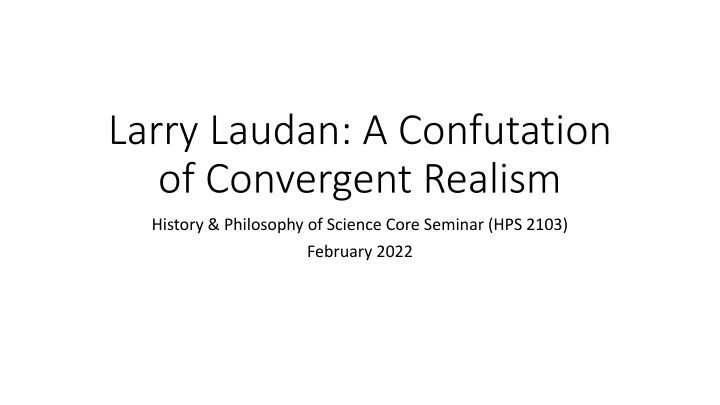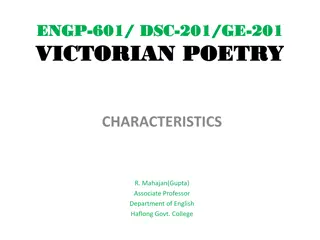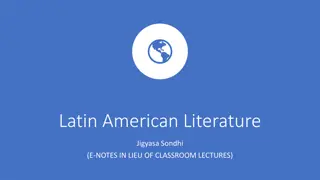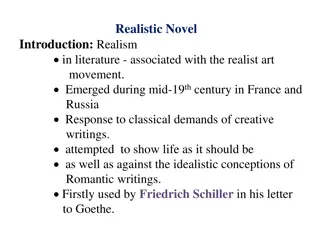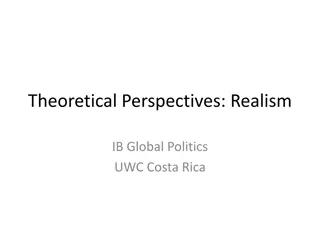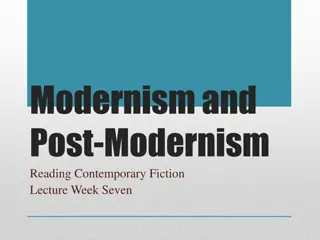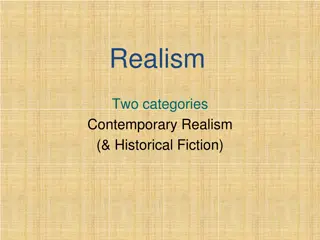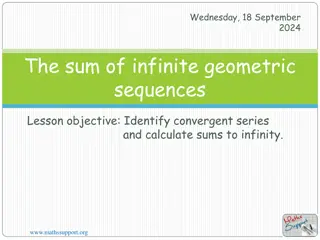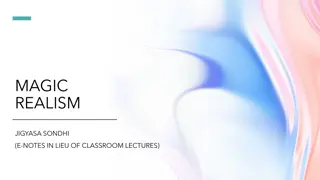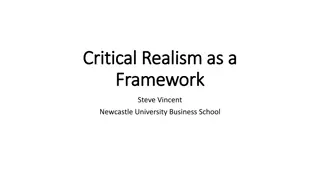Critique of Convergent Realism by Larry Laudan
Larry Laudan's "A Confutation of Convergent Realism" challenges the notion of epistemic realism by arguing that historical evidence does not fully support it. He discusses Convergent Epistemological Realism (CER) and presents abductive arguments questioning the truth and empirical success of scientific theories. The main thesis debunks the idea that successful scientific theories necessarily reflect truth, highlighting the complexities of scientific progress and theory evolution.
Download Presentation

Please find below an Image/Link to download the presentation.
The content on the website is provided AS IS for your information and personal use only. It may not be sold, licensed, or shared on other websites without obtaining consent from the author.If you encounter any issues during the download, it is possible that the publisher has removed the file from their server.
You are allowed to download the files provided on this website for personal or commercial use, subject to the condition that they are used lawfully. All files are the property of their respective owners.
The content on the website is provided AS IS for your information and personal use only. It may not be sold, licensed, or shared on other websites without obtaining consent from the author.
E N D
Presentation Transcript
Larry Laudan: A Confutation of Convergent Realism History & Philosophy of Science Core Seminar (HPS 2103) February 2022
The Main Thesis To show that epistemic realism, is neither supported by, nor has it made sense of, much of the available historical evidence.
Convergent Epistemological Realism (CER) R1) Scientific theories (at least in the 'mature' sciences) are typically approximately true and more recent theories are closer to the truth than older theories in the same domain; R2) The observational and theoretical terms within the theories of a mature science genuinely refer R3) Successive theories in any mature science will be such that they 'preserve' the theoretical relations and the apparent referents of earlier theories R4) Acceptable new theories do and should explain why their predecessors were successful insofar as they were successful. R5) Theses (R1)-(R4) entail that ('mature') scientific theories should be successful; indeed, these theses constitute the best, if not the only, explanation for the success of science. The empirical success of science accordingly provides striking empirical confirmation for realism.
Convergent Epistemological Realism (CER) R1) Scientific theories (at least in the 'mature' sciences) are typically approximately true and more recent theories are closer to the truth than older theories in the same domain; R2) The observational and theoretical terms within the theories of a mature science genuinely refer R3) Successive theories in any mature science will be such that they 'preserve' the theoretical relations and the apparent referents of earlier theories R4) Acceptable new theories do and should explain why their predecessors were successful insofar as they were successful. R5) Theses (R1)-(R4) entail that ('mature') scientific theories should be successful; indeed, these theses constitute the best, if not the only, explanation for the success of science. The empirical success of science accordingly provides striking empirical confirmation for realism.
First Abductive Argument for Realism 1. If scientific theories are approximately true, they will typically be empirically successful; 2. If the central terms in scientific theories genuinely refer, those theories will generally be empirically successful; 3. Scientific theories are empirically successful. Therefore: 4. (Probably) Theories are approximately true and their terms genuinely refer.
Second Abductive Argument for Realism 1. If the earlier theories in a 'mature' science are approximately true and if the central terms of those theories genuinely refer, then later more successful theories in the same science will preserve the earlier theories as limiting cases; 2. Scientists seek to preserve earlier theories as limiting cases and generally succeed. Therefore: 3. (Probably) Earlier theories in a 'mature' science are approximately true and genuinely referential.
Three Main Themes Reference and Success Approximate Truth and Success Retention of Earlier Theories and Reference/Approximate Truth (Diachronic CER)
Reference and Success A theory whose central terms genuinely refer will be a successful theory (from reference to success) If a theory is successful, we can reasonably infer that its central terms genuinely refer (from success to reference)
From Reference to Success - There are many referring theories that have been very unsuccessful: The 18thcentury chemical atomic theory, and the Proutian theory, the Wegenerian theory. - But if the relations change how the reference can remain intact? Realists here seem to assume Norton s sparse meaning space. - This issue arises from separating reference and truth. - Q1: Do you think the realist can defend the relation between reference and success by arguing that the unsuccessful predictions of these theories should be traced back to their incorrect elements and their (a few) successful predictions to their genuine references?
From Success to Reference - There are many relatively successful theories that are non-referring (e.g., aether theories, phlogistic theories). - A weakening of this claim to a relation between success and reference in at least some (and not necessarily all) of a theory s central concepts threatens the realist s integral claims about the truth of deep structures, convergence and retention.
Approximate Truth and Success If a theory is approximately true, then it will be explanatorily successful (from truth to success) If a theory is explanatorily successful, then it is probably approximately true (from success to truth)
From Approximate Truth to Success - There is no satisfactory notion of approximate truth that entails this connection. - Even under the most famous account of approximate truth (Popperian account which suggests a theory is approximately true if its truth content is greater than its falsity content), approximate truth does not logically entail success. - If there is such a connection it must be independently argued for. - Really?! - Notably, he does not provide any historical examples - Q2) Even if the realist had a semantically adequate characterization of approximate or partial truth, and even if that semantics entailed that most of the consequences of an approximately true theory would be true, he would still be without any criterion that would epistemically warrant the ascription of approximate truth to a theory. (p. 32) Why?
From Success to Approximate Truth - To be approximately true a theory s central terms should refer, but there are many theories in history of science that were successful but non- referential (thus, not approximately true) recall for example aether theories, phlogistic theories. - There were many theories in the past which were both genuinely referring and empirically successful but are not considered as approximately true. (e.g., successful geological theories prior to the 1960s which denied any lateral motion to the continents, or those chemical and physical theories of the late 19th century which explicitly assumed that matter was neither created nor destroyed) - This argument only works for very strong forms of realism
First Abductive Argument for Realism - Revisited 1. If scientific theories are approximately true, they will typically be empirically successful; 2. If the central terms in scientific theories genuinely refer, those theories will generally be empirically successful; 3. Scientific theories are empirically successful. Therefore: 4. (Probably) Theories are approximately true and their terms genuinely refer.
Diachronic CER Cl) If earlier scientific theories are successful and thereby approximately true, then scientists should only accept later theories which retain appropriate portions of earlier theories; C2) As a matter of fact, scientists do adopt the strategy of (C1) and manage to produce new, more successful theories in the process; C3) The 'fact' that scientists succeed at retaining appropriate parts of earlier theories in more successful successors shows that the earlier theories did genuinely refer and were approximately true. And thus, the strategy propounded in (C1) is sound
Retention of Earlier Theories This is not supported by the historical literature of science. For example, literally no one criticized the wave theory of light because it did not preserve the theoretical mechanisms of the earlier corpuscular theory. The later scientific theories do not typically (taken to mean most of the time) retain all the mechanisms of earlier theories. (e.g., statistical mechanics does not incorporate all the mechanisms of thermodynamic) Even the classical mechanics, as the realist s paradigm example, is not a limiting case for the post- classical mechanics and gravitational theory . As scientists use the term 'limiting case , T1 can be a limiting case of T2 only if: (a) all the variables (observable and theoretical) assigned a value in T1 are assigned a value by T2 and (b) the values assigned to every variable of T1 are the same as, or very close to, the values in T2 I don t think the author is charitable here. The argument merely requires that an appropriate portion of theories be retained. Also, the paper mentions many other realists who merely require the retention of confirmed portions or true consequences or truth content .
Millers Analysis and Syntactic View of theories a) the familiar requirement that a successor theory, T2, must both preserve as true the true consequences of its predecessor, T1, and explain T1's anomalies is contradictory; b) that if a new theory, T2, involves a change in the ontology or conceptual framework of a predecessor, T1, then T1 will have true and determinate consequences not possessed by T2; c) that if two theories, T1, and T2, disagree, then each will have true and determinate consequences not exhibited by the other.
Gems The paper is well structured, but he could use simpler words and expressions and less rhetoric. The distinction made between semantic realism, intentional realism, and epistemological realism and comparing it with positivist and pragmatist. Putnam s claim that "realism is, so to speak, 'science's philosophy of science' " and that "science taken at 'face value' implies realism . Applying the realist view about scientific theories to the realism itself by second-order abduction. And comparing realism to scientific theories. Shouldn t such realists be committed to considering realism as at best (probably) approximately true?
